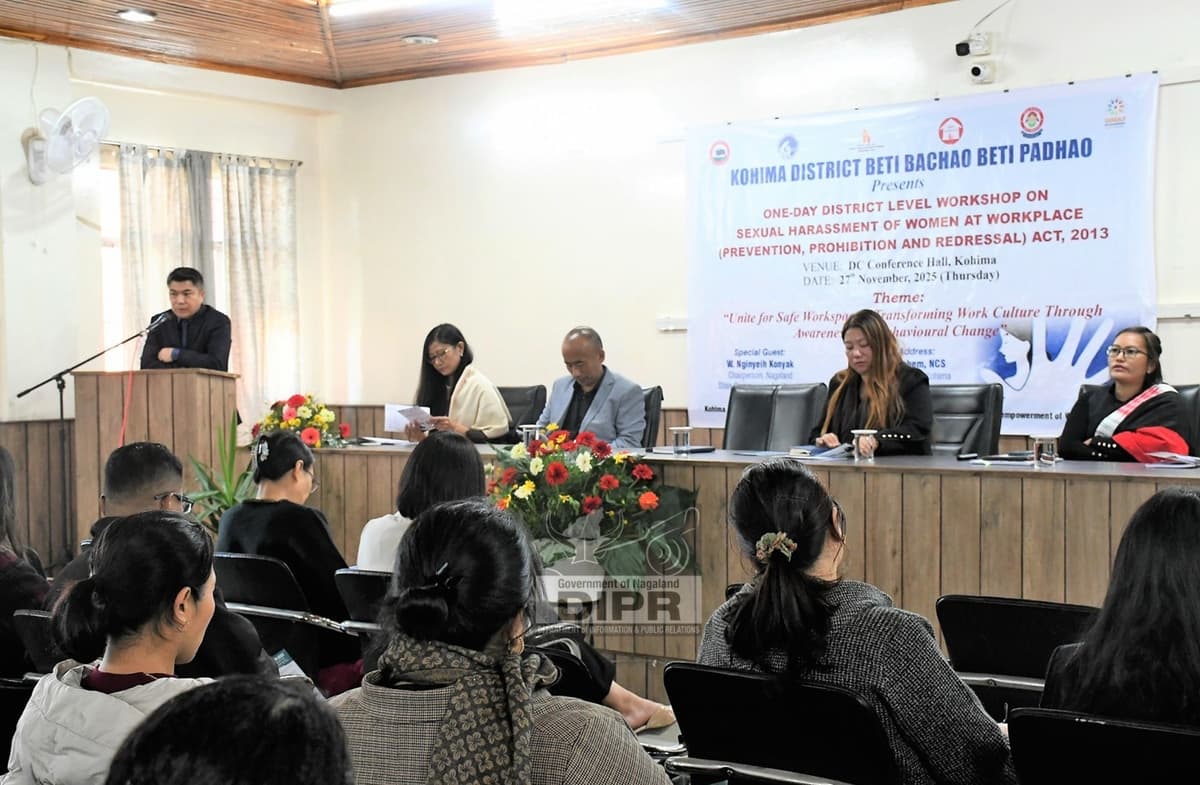Kohima District BBBP organises one-day district-level workshop on Sexual Harassment of Women at Workplace (Prevention, Prohibition and Redressal) Act.
Share

DIMAPUR — The Kohima District Beti Bachao Beti Padhao (BBBP), under Mission Shakti, organised a one-day district-level workshop on Sexual Harassment of Women at Workplace (Prevention, Prohibition and Redressal) Act, 2013 at DC’s conference hall, on the theme ‘Unite for safe workspaces: Transforming work culture through awareness and behavioural change.’
Deputy Commissioner of Kohima, who is also the chairman of District Level Committee (DLC) Mission Shakti, B Henok Buchem, in his keynote address, said workplace safety is not merely a matter of compliance but a culture that requires unified commitment from every individual.
The DC reminded the participants that awareness must translate into action, and that behavioural change is central to making workplaces psychologically safe. Citing the One Stop Centre in Kohima as an example of support systems in place, Buchem emphasised that “safety is a journey without a final destination” and encouraged departments to celebrate good practices and continually improve.
Also read: Ngada festival celebrated in Chümoukedima
Special guest W Nginyeih Konyak, Chairperson of Nagaland State Commission for Women (NSCW), noted that sexual harassment is not just a legal issue but one concerning dignity and respect.
She said the Commission has handled several cases where women suffer silently due to stigma, fear of job loss and victim-blaming.
Nginyeih urged departments to introspect whether their workplaces are truly safe for women and to strengthen reporting systems, training and sensitisation. She reminded the participants that committees on paper are not enough - implementation and behavioural change are crucial.
Delivering the welcome address, Ruopfukuotuo Noudi, Additional Deputy Commissioner of Kohima, highlighted the importance the government places on the POSH Act.
He stressed that the act mandates all employers to ensure safety, dignity and equality for women at the workplace through prevention, prohibition and redressal mechanisms. Noudi expressed hope that the workshop would renew the collective commitment to creating safe, respectful workplaces across the district.
A pledge to ‘Help end violence against women in Nagaland and beyond’ was administered by Anyile Khamo, District Programme Officer & District Nodal Officer, Mission Shakti, Kohima.
Apila Sangtam, legal consultant at NSCW, presented an overview of the POSH Act, 2013. She said empowerment is not limited to schemes or statements but in standing together for justice.
Apila explained the objectives of the act, definitions of sexual harassment, the difference between welcome and unwelcome behaviour, and the coverage of both organised and unorganised sectors.
She also highlighted provisions related to Internal Committees (IC), Local Committees (LC), complaint procedures, confidentiality requirements, penalties for non-compliance and the SHE-Box portal. Additionally, she also shared national statistics on crimes against women and stressed the need for proper implementation of the act at all levels.
A session on ‘The why behind POSH - Mindset and cultural change’was delivered by Vizokhrienuo Khro, case worker at Sakhi-One Stop Centre, Kohima. She spoke on conditioning, unconscious bias and the need to stop normalising inappropriate jokes and behaviour.
Vizokhrienuo described the behavioural dimensions of harassment—verbal, physical, digital and micro-aggressions—and emphasised that harassment is defined not by intention but by impact. She urged participants to cultivate respectful work habits, encourage early conversations, and model positive behaviour in their departments. “POSH is not just an Act; it is a cultural reform tool,” she said.
The workshop concluded with discussions and interactions among ICC and LCC members, officials, and participants from various departments. The programme was chaired by Ane Khieya, EAC Kohima and the vote of thanks was delivered by Kesoneinuo Kense, gender specialist at District Hub for Empowerment of Women (DHEW), Kohima.